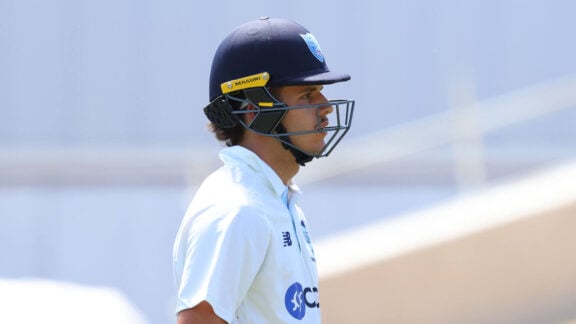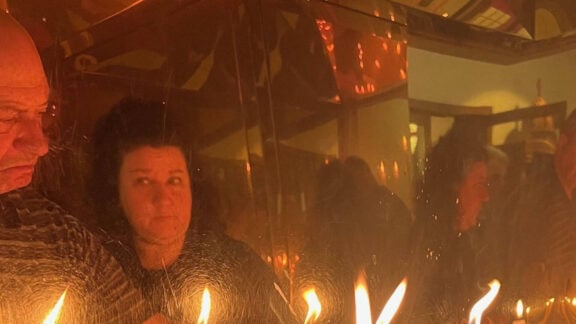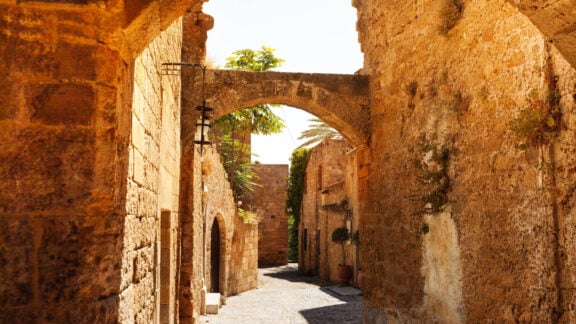Greek Australian Professor Maria Forsyth AM from Deakin University has been named a finalist for the Australian Museum Eureka Prize for Outstanding Mentor of Young Researchers.
Forsyth is one of 55 people nominated in the nation’s premier science awards across a broad spectrum of research, from environmental to innovative technologies, citizen science, leadership and mentoring.
The professor is a world leader in developing advanced materials for a range of energy and infrastructure technologies, which she does through mentoring students and young researchers.
In June, the Fellow of the Australian Academy of Science received an Order of Australia for her outstanding service to science.
She told Neos Kosmos it was unexpected and a huge honour but her Greek parents can’t really comprehend the magnitude of it.
“My parents when I found out and I was able to tell them, they couldn’t tell what it meant, but they kind of got the gist,” she said.
Forsyth was happy to talk to Neos Kosmos, for all she knew about Greek news sources growing up was this paper, and her parents, who would read it every week, will be happy to see something on their daughter.
So funnily enough, if the Order of Australia wasn’t big enough already, being featured in the Greek paper is a massive milestone in their eyes.
In a nutshell, Forsyth describes her work as involving batteries and “looking at helping address the climate change issues by developing safer, hopefully more affordable and sustainable battery tech.” Her and her team want to “help us transition into a cleaner energy society.”
One exciting area that she is currently researching on is sodium-ion batteries, which are said to be cheaper, environmentally sustainable and safer to ship than the current widely used lithium-ion batteries.
Forsyth says sodium is the next front runner for battery technology, even to go into electric vehicles, with China already beginning to market them as alternatives to “what everyone already uses in everything”.
“The sodium-ion battery is a lot more sustainable… because you’ve got to mine (lithium) and that takes a lot of energy, a lot of water and a lot of environmental impact,” she said.
“It’s also very localised, for example, we’re lucky in Australia, we have a lot of lithium over in WA and the rest of it a lot of it is in South America.
“But other parts of the world don’t have it, and so they’re reliant on, in some cases, a couple of geopolitically unstable countries, not Australia obviously, to supply that lithium.
“Whereas sodium is salt. It’s salt, literally sodium chloride. Salt. So, you can get it anywhere. In sea water. It’s everywhere, all over the world, easy to access.”

Other than lithium itself, the batteries rely on critical minerals that are scarce and only found in places like Africa, where some of the mining is questionable in terms of ethics according to the Greek Aussie.
Forsyth says the difference between lithium-ion and sodium-ion is that the former is much more energy dense, but even though the currently used batteries are stronger, we don’t necessarily need it for everything.
“What that means is you can drive your car much further on a lithium battery than you can on the sodium battery because you’ve got more electrons, you’ve got more capacity,” she said.
“That’s because of sodium size and how energetic sodium is. But for a lot of applications, we don’t need that high capacity.
“If we’re driving a car around the city, you don’t need lithium-ion batteries. You can get away with something that’s less expensive, safer, and gives you slightly less energy density. But lithium is important for things like, say, drones or aerospace, or where you really need lightweight and high energy.”
As aforementioned Forsyth oversees this research, and works with a group of younger people, mentoring them, and that is what she is potentially being awarded for.
This is the work she says she loves- helping them fuel their passion.
“The best part of my job without any doubt is watching my people grow and succeed. Watching the lightbulb moments. Watching their excitement when a great science result presents itself, seeing their delight in getting their first paper published,” she said.
“But it also comes with down side when things just don’t work, when the research is a struggle, when papers are rejected or reviews seem harsh and unfair. Then mentoring means picking them up and dusting them off and making sure they don’t lose their confidence.
For me mentoring is very personal. I am proud of each and every one of my students and younger researchers. At the heart of what we do is wanting to make a difference in the world through our research – they all aspire to make a difference.”
She also knows that as a woman in a male dominated field, she serves as a role model, a visual she didn’t have breaking into the field. On top of that, she has recently realised the importance of being a Greek woman in her work.
“The older I get, the more I realise how important, not just the role model of the female, but a role model to the Greek female is.”
“Not just in Australia, but to my cousins and cousins’ kids in Greece because they see someone who can achieve maybe more than what they thought they could.
“Just that ability to see someone achieving something in the Greek circle as well, I think for me that’s also very important. So that is something I think more as I get older, being an important role that I must play as.”
Years of hard work, especially as a woman in science have been tough, but she credits the work ethic of her Greek parents in helping her to keep going.
Forsyth, whose family name is Fragoulis was actually born in Greece, in a village called Paleokastro on the island of Samos. At two years old, she and her family moved to Melbourne in the 1966-67 and settled in Richmond.
She remembers Richmond having a very large Greek population in the 1960s and 1970s with Type Street being almost entirely Greek.

Despite not having a formal education themselves, her parents were determined she and her brother did well in school. They also attended Greek school at Agia Triada on Burnley Street.
Hard working parents, with her mother in the weaving factory, even on weekends and doing overtime, while her father did several jobs including as an oyster opener and cleaner.
Her parents eventually started their own wholesale seafood business in Richmond and moved to the eastern suburbs.
Forsyth spent every summer working the ‘fish shop’ – something she continued into adulthood every Christmas week until very recently, bestowing this ‘tradition’ on her own children too.
All while of course studying and doing a double degree in engineering and science, later swapping for the latter and doing a PHD in Chemistry.








